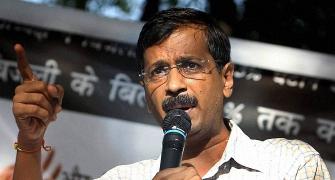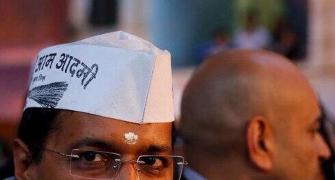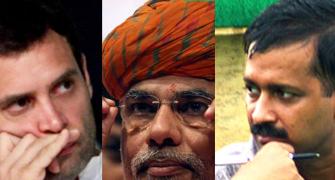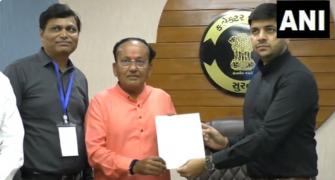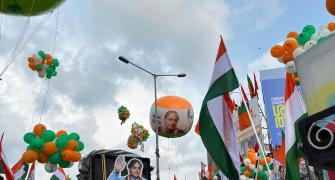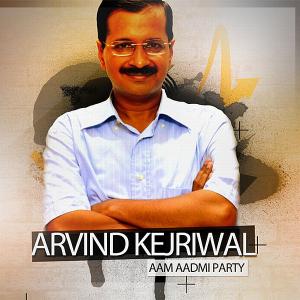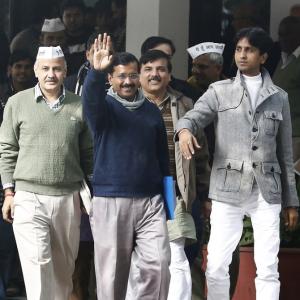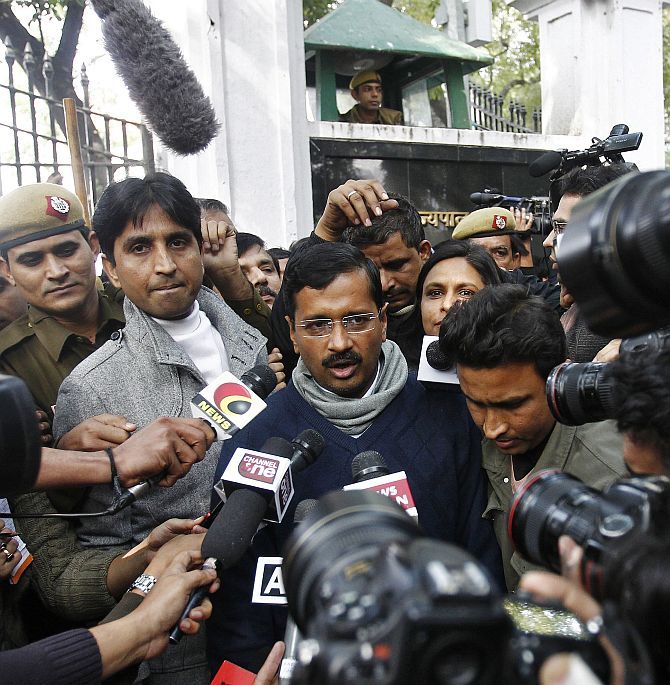 'Arvind Kejriwal displayed crass male chauvinism and gender illiteracy in saying that "rape tendencies arise out of sex, prostitution and drug rackets." This shows a failure to grasp that rape has little to with sex, and even less with drugs.'
'Arvind Kejriwal displayed crass male chauvinism and gender illiteracy in saying that "rape tendencies arise out of sex, prostitution and drug rackets." This shows a failure to grasp that rape has little to with sex, and even less with drugs.'
'Such remarks are far worse than the deplorable comments of policemen and politicians who attribute rapes to women's "provocative" attire or their outdoor presence at night!' says Praful Bidwai.
A month after storming to power in Delhi following a spectacular electoral debut, the Aam Aadmi Party tarnished its image by taking three false steps.
First, Law Minister Somnath Bharti and Women and Child Welfare Minister Rakhi Birla indulged in obnoxious vigilantism.
Second, the AAP's top leadership, including Chief Minister Arvind Kejriwal, defended their conduct and even commended Bharti's actions.
Third, the AAP's official Hindi organ Aap ki Kranti on January 24 recorded on its Web site the 'shortlisting of Bangladeshi infiltrators' as one of the 15 achievements of its government.
Although not widely noticed, this was disturbingly reminiscent of the Hindutva forces's past attempts to illegally expel or summarily deport Bengali-speakers by branding them Bangladeshis.
The touting of this 'achievement' so greatly embarrassed some AAP leaders that the entire e-magazine was withdrawn after attempts to pass it off as someone else's handiwork failed.
But the offending sentence showed that communal prejudice and xenophobia are alive in the AAP's ranks; their votaries have no qualms about using words like 'infiltrator' which suggest not just illegal migration, but dark intent to 'subvert the Indian nation.'
Public attention was diverted from the first misstep by the Rail Bhavan dharna -- which provoked charges of 'anarchism' and worse. But the AAP should not be faulted much for occupying a visible public space in central Delhi, as distinct from tiny Jantar Mantar, where protests are confined and made invisible, unlike in any other democracy.
Nor should the AAP's demand for making Delhi's police accountable to its elected government, and rooting out corruption in the force, be lightly dismissed. But this isn't enough. The crucial issue is police reform, and how the force should be used.
The AAP's real culpability lies elsewhere: Most gravely, in Bharti's attempt to bully the police to arrest four African women in Khirki who, the local residents alleged without evidence, were involved in drug-peddling and prostitution.
When the police rightly refused, citing lack of a warrant, and the rule that no woman be arrested after sunset, a rowdy mob surrounded the women. They were racially profiled, abused, manhandled for hours and forcibly taken to hospital and subjected to humiliating medical tests.
Videos show Bharti saying the Africans 'are not like us,' inciting the mob, and insulting police officers.
Nine women's organisations, both independent and politically affiliated, condemned Bharti for racism, xenophobia and male-supremacism, and said his conduct violated human rights.
The minister was trying to cynically exploit the widespread prejudice prevalent in India against Africans based on the colour of their skin. They are stereotyped and baselessly accused of peddling drugs.
Medical tests showed the harassed women hadn't consumed drugs. This made the injustice even more egregious. Such treatment of Africans reveals a lack of civility and respect for natural justice, which is part of a lynch-mob's anti-democratic mindset.
Africans living in Khirki are routinely pelted with pebbles, subjected to humiliating taunts and treated like animals.
If AAP leaders had a modicum of civility, they would have deplored Bharti's actions and sacked him from the cabinet pending the results of inquiries against him by a judge and the Delhi Commission for Women. But they backed him and staged a dharna against police 'insubordination'.
The dharna was staged for narrow party-parochial considerations, and in response to the public criticism of the AAP government for its cavalier reaction to the gang-rape of a Danish tourist.
Chief Minister Arvind Kejriwal, who had promised to make Delhi safe for women -- unlike the 'incompetent' Sheila Dikshit -- first pleaded helplessness when the rape happened, and then resorted to crude dramatics.
Kejriwal displayed crass male chauvinism and gender illiteracy in saying that 'rape tendencies arise out of sex, prostitution and drug rackets.' This shows a failure to grasp that rape has little to with sex, and even less with drugs. It is about subjugating women through force in a patriarchal society.
Such remarks are far worse than the deplorable comments of policemen and politicians who attribute rapes to women's 'provocative' attire or their outdoor presence at night!
Yet, AAP leaders harp on a notion of good policing as something based on control of the police by the aam aadmi or 'the local people' through mohalla committees and gram sabhas.
The AAP's vision document wants police stations to be 'directly accountable' to mohalla sabhas -- never mind the rule of law, proper procedures, and giving accused persons a chance to defend themselves.
They obviously haven't heard of Dr Babasaheb Ambedkar's warning that the village and the mohalla are the worst repositories of casteism, patriarchy, male-supremacism and other parochial prejudices; excessive powers for gram panchayats in the absence of structural social change and anti-caste reform are a charter for the further enslavement of Dalits.
The AAP's idea of policing is democratic only in appearance. There is only a thin line of demarcation between mohalla-based democracy and majoritarianism.
If a majority is allowed to summarily punish anyone who is different or 'deviant' in defying 'customs', it will act exactly like khap panchayats.
Brute majorities can do terrible things -- including pogroms and mass killings.
The troubled concept at work here is the 'People' as an undifferentiated, homogenous entity, with equal distribution of power, and without divisions along class, caste, religion, gender and ethnic lines.
This is a dangerous myth. As is the AAP's woolly notion of the aam aadmi, which includes everyone from the 'honest' billionaire, through the schoolteacher, to the oppressed pauper.
The 'People,' defined thus can be manipulated by dominant classes to act as the collective oppressors of minorities.
Blinded by prejudice and narrow self-interest, the 'People' can exercise power untrammelled by law, ethics or compassion -- with potentially horrendous consequences.
What we need is not 'People', but citizens committed to the universal values of democracy and an enlightened view of the Constitution, who give primacy to marginalised and excluded social groups within a common project to build a better, more humane, more equal and compassionate society.
Such citizens alone can become the true agents of progressive change with an inclusive agenda.
The AAP clearly lacks such a vision. Its dogmatic, a priori rejection of ideology and all broad programmatic perspective deprives its 'solutions-based' approach of the moral compass necessary to produce the criteria to judge what is in the larger public interest. Indeed, it could also impede its ability to learn from its mistakes.
Unless the AAP acknowledges its blunders and corrects course, it will betray its promise of providing a real alternative to the Congress and the Bharatiya Janata Party which can take this society forward.
The AAP is a young party and still evolving. So it would be wrong to judge it harshly. But it is necessary to point out its missteps and the divisions within its leadership.
Some AAP leaders, perhaps a majority at the top, are conservatively inclined. They would like the party to focus primarily on the upper-middle and middle classes and adopt conformist right-of-centre policies in line with pressure from the corporate-controlled media.
On the other hand, a number of well-regarded Left-wing individuals such as Jawaharlal Nehru University professor and long-standing Communist Party of India member Kamal Mitra Chenoy have joined the AAP.
Like many public-spirited citizens, they believe that the AAP, not the Congress, can effectively impede Narendra Modi's bid for power by taking a number of votes away from the BJP.
How the AAP makes its policy choices is an open question. The composition of its economic policy team, with an over-representation of pro-business individuals, doesn't inspire much confidence. The AAP should not accept its report without broad-based consultations and thorough debate.
If the AAP wants to put up a spirited fight against Modi, it will have to take a clear stand against Hindutva and adopt an economic agenda that provides an alternative to his neoliberal policies.
Modi has come to personify three extremely negative traits: Raw corporate power, virulent Hindutva, and authoritarian cult-based politics.
Defeating Modi is a high priority for those committed to defending democracy. As things stand, it is not clear if AAP can rise to that challenge.
Image: Delhi Chief Minister Arvind Kejriwal. 'If a majority is allowed to summarily punish anyone who is different or 'deviant' in defying 'customs', Praful Bidwai warns the Aam Aadmi Party leadership, 'it will act exactly like khap panchayats. Brute majorities can do terrible things -- including pogroms and mass killings.'

